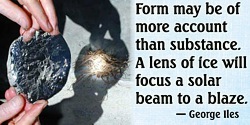|
George Iles
(1852 - 1942)
author and populariser of science who wrote articles for Popular Science Monthly with topics including mathematics, physics and heredity. He also published several books on science and invention, as well as editing a series of short autobiographies, and Canadian Stories. Outside of his written record, it seems little remains known about him.
|
Science Quotes by George Iles (45 quotes)
“I see no shadows,” saith the sun:
Yet he casts them every one.
Yet he casts them every one.
— George Iles
Quoted without citation in George Iles, Canadian Stories (1918), 150. Webmaster has found no other source for this couplet, and wonders if it was coined by the author himself to ornament a chapter heading, or not. Please contact Webmaster if you know the primary source.
[Students or readers about teachers or authors.] They will listen with both ears to what is said by the men just a step or two ahead of them, who stand nearest to them, and within arm’s reach. A guide ceases to be of any use when he strides so far ahead as to be hidden by the curvature of the earth.
— George Iles
From Lecture (5 Apr 1917) at Hackley School, Tarrytown, N.Y., 'Choosing Books', collected in Canadian Stories (1918), 150.
A calculating engine is one of the most intricate forms of mechanism, a telegraph key one of the simplest. But compare their value.
— George Iles
From chapter 'Jottings from a Note-Book', in Canadian Stories (1918), 174.
A century ago astronomers, geologists, chemists, physicists, each had an island of his own, separate and distinct from that of every other student of Nature; the whole field of research was then an archipelago of unconnected units. To-day all the provinces of study have risen together to form a continent without either a ferry or a bridge.
— George Iles
From chapter 'Jottings from a Note-book', in Canadian Stories (1918), 182-183.
A great book is a mine as well as a mint: it suggests and excites as much thought as it presents in finished form.
— George Iles
From chapter 'Jottings from a Note-book', in Canadian Stories (1918), 182.
A magician of old waved a wand that he might banish disease, a physician to-day peers through a microscope to detect the bacillus of that disease and plan its defeat. The belief in miracles was premature, that is all; it was based on dreams now coming true.
— George Iles
From chapter 'Jottings from a Note-book', in Canadian Stories (1918), 176.
A man's own addition to what he learns is cement to bind an otherwise loose heap of stones into a structure of unity, strength, and use.
— George Iles
From chapter 'Jottings from a Note-Book', in Canadian Stories (1918), 180.
A superstition is a premature explanation that overstays its time.
— George Iles
From chapter 'Jottings from a Note-book', in Canadian Stories (1918), 168.
A tree nowhere offers a straight line or a regular curve, but who doubts that root, trunk, boughs, and leaves embody geometry?
— George Iles
From chapter 'Jottings from a Note-Book', in Canadian Stories (1918), 172.
Adam Smith says that nobody ever imagined a god of weight—and he might have added, of the multiplication table either. It may be that the relations of Nature are all as inevitable as that twice two are four.
— George Iles
From chapter 'Jottings from a Note-book', in Canadian Stories (1918), 178.
At first the squirrel spins his cage; then the cage spins him. Men of business may take warning.
— George Iles
From chapter 'Jottings from a Note-book', in Canadian Stories (1918), 171.
Boundaries which mark off one field of science from another are purely artificial, are set up only for temporary convenience. Let chemists and physicists dig deep enough, and they reach common ground.
— George Iles
From chapter 'Jottings from a Note-Book', in Canadian Stories (1918), 183.
Chemists show us that strange property, catalysis, which enables a substance while unaffected itself to incite to union elements around it. So a host, or hostess, who may know but little of those concerned, may, as a social switchboard, bring together the halves of pairs of scissors, men who become life-long friends, men and women who marry and are happy husbands and wives.
— George Iles
From chapter 'Jottings from a Note-book', in Canadian Stories (1918), 179.
Decision differs from willfulness as atmospheric pressure from the fitful wind.
— George Iles
From chapter 'Jottings from a Note-book', in Canadian Stories (1918), 170.
Degree is much: the whole Atlantic might be lukewarm and never boil us a potato.
— George Iles
From chapter 'Jottings from a Note-book', in Canadian Stories (1918), 167.
Discovery begins by finding the discoverer.
— George Iles
From chapter 'Jottings from a Note-book', in Canadian Stories (1918), 169.
Doubt is the beginning, not the end, of wisdom.
— George Iles
From chapter 'Jottings from a Note-book', in Canadian Stories (1918), 167.
Dumbness and silence are two different things.
— George Iles
From chapter 'Jottings from a Note-Book', in Canadian Stories (1918), 170.
Educated folk keep to one another's company too much, leaving other people much like milk skimmed of its cream.
— George Iles
From chapter 'Jottings from a Note-Book', in Canadian Stories (1918), 176.
Emergency is a subsoil plow bringing to light depths of mind and character before unknown and unsuspected.
— George Iles
From chapter 'Jottings from a Note-book', in Canadian Stories (1918), 184.
Error held as truth has much the effect of truth. In politics and religion this fact upsets many confident predictions.
— George Iles
From chapter 'Jottings from a Note-Book', in Canadian Stories (1918), 177.
Evolution pays and that is why there is evolution
— George Iles
From chapter 'Jottings from a Note-Book', in Canadian Stories (1918), 183.
Form may be of more account than substance. A lens of ice will focus a solar beam to a blaze.
— George Iles
From chapter 'Jottings from a Note-book', in Canadian Stories (1918), 167.
Hope is faith holding out its hands in the dark.
— George Iles
From chapter 'Jottings from a Note-book', in Canadian Stories (1918), 167.
Ignorance may find a truth on its doorstep that erudition vainly seeks in the stars.
— George Iles
From chapter 'Jottings from a Note-book', in Canadian Stories (1918), 168.
Is any knowledge worthless? Try to think of an example.
— George Iles
From chapter 'Jottings from a Note-Book', in Canadian Stories (1918), 169.
Let truth be a banner big enough to hide the man who holds it up.
— George Iles
From chapter 'Jottings from a Note-Book', in Canadian Stories (1918), 169.
Men will never disappoint us if we observe two rules: (i) To find out what they are; (2) to expect them to be just that.
— George Iles
From chapter 'Jottings from a Note-book', in Canadian Stories (1918), 175.
Nature is full of by-ends. A moth feeds on a petal, in a moment the pollen caught on its breast will be wedding this blossom to another in the next county.
— George Iles
From chapter 'Jottings from a Note-Book', in Canadian Stories (1918), 170.
No gun is perfectly true. So the marksman, that he may hit the bull's-eye, points elsewhere.
— George Iles
From chapter 'Jottings from a Note-Book', in Canadian Stories (1918), 169.
Nothing cools so fast as undue enthusiasm. Water that has boiled freezes sooner than any other.
— George Iles
From chapter 'Jottings from a Note-Book', in Canadian Stories (1918), 171.
Obvious facts are apt to be over-rated. System-makers see the gravitation of history, and fail to observe its chemistry, of greater though less evident power.
— George Iles
From chapter 'Jottings from a Note-book', in Canadian Stories (1918), 179.
Some young folks have wind-fall minds, prematurely detached from the tree of knowledge for a life-long sourness and pettiness.
— George Iles
From chapter 'Jottings from a Note-Book', in Canadian Stories (1918), 181.
Sound travels farthest as music; the most telling form of truth is poetry.
— George Iles
From chapter 'Jottings from a Note-book', in Canadian Stories (1918), 167.
Ten builders rear an arch, each in turn lifting it higher; but it is the tenth man, who drops in the keystone, who hears our huzzas.
— George Iles
From chapter 'Jottings from a Note-book', in Canadian Stories (1918), 167.
The orchestration of truth demands many diverse instruments, and a consummate wielder of the baton.
— George Iles
The orchestration of truth demands many diverse instruments, and a consummate wielder of the baton.
There is one best path to the mountain crest; yet there are other paths, nearly as good. Let Youth be assured that the steeps of success have as many paths as there are stout-hearted climbers.
— George Iles
From chapter 'Jottings from a Note-book', in Canadian Stories (1918), 173-174.
There may be a golden ignorance. If Professor Bell had known how difficult a task he was attempting, he would never have given us the telephone.
— George Iles
From chapter 'Jottings from a Note-book', in Canadian Stories (1918), 178.
To render aid to the worthless is sheer waste. Rain does not freshen the Dead Sea, but only enables it to dissolve more salt.
— George Iles
From chapter 'Jottings from a Note-Book', in Canadian Stories (1918), 172.
Truth is better disengaged from error than torn from it.
— George Iles
From chapter 'Jottings from a Note-Book', in Canadian Stories (1918), 177.
What was at first merely by-the-way may become the very heart of a matter. Flints were long flaked into knives, arrowheads, spears. Incidentally it was found that they struck fire; to-day that is their one use.
— George Iles
From chapter 'Jottings from a Note-book', in Canadian Stories (1918), 178.
When a learner, in the fullness of his powers, comes to great truths unstaled by premature familiarity, he rejoices in the lateness of his lessons.
— George Iles
From chapter 'Jottings from a Note-Book', in Canadian Stories (1918), 168.
When a thinker improves in expression, it is as if he thought better than before.
— George Iles
From chapter 'Jottings from a Note-book', in Canadian Stories (1918), 172.
When we try to imagine a chaos we fail. ... In its very fiber the mind is an order and refuses to build a chaos.
— George Iles
From chapter 'Jottings from a Note-Book', in Canadian Stories (1918), 170.
Whoever ceases to be a student has never been a student.
— George Iles
From chapter 'Jottings from a Note-Book', in Canadian Stories (1918), 169.
See also:
- George Iles - context of quote “Superstition is a premature explanation” - Medium image (500 x 250 px)
- George Iles - context of quote “Superstition is a premature explanation” - Large image (800 x 400 px)
- George Iles - context of quote “A lens of ice will focus a solar beam” - Medium image (500 x 250 px)
- George Iles - context of quote “A lens of ice will focus a solar beam” - Large image (800 x 400 px)






 In science it often happens that scientists say, 'You know that's a really good argument; my position is mistaken,' and then they would actually change their minds and you never hear that old view from them again. They really do it. It doesn't happen as often as it should, because scientists are human and change is sometimes painful. But it happens every day. I cannot recall the last time something like that happened in politics or religion.
(1987) --
In science it often happens that scientists say, 'You know that's a really good argument; my position is mistaken,' and then they would actually change their minds and you never hear that old view from them again. They really do it. It doesn't happen as often as it should, because scientists are human and change is sometimes painful. But it happens every day. I cannot recall the last time something like that happened in politics or religion.
(1987) -- 


